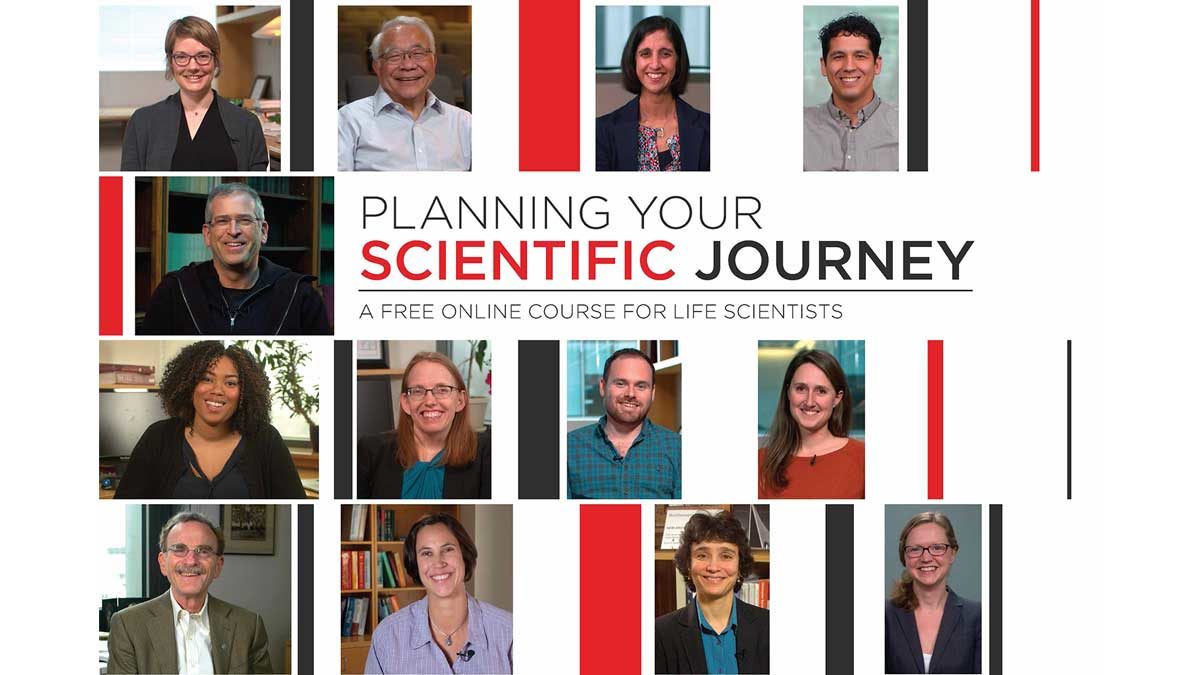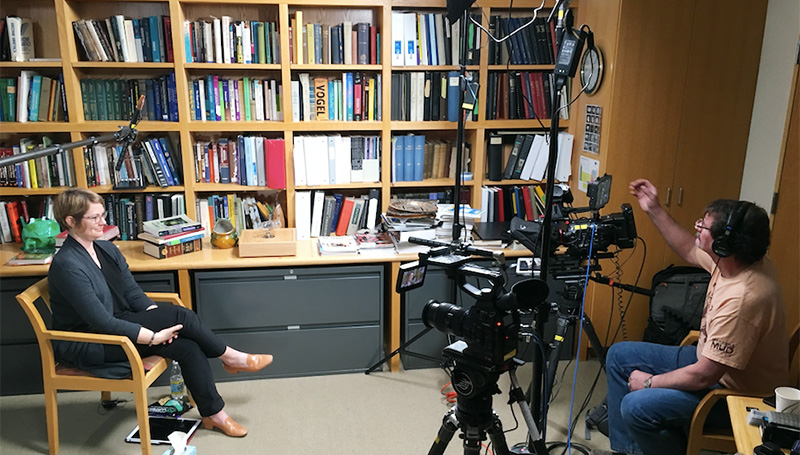By Kanaga Rajan

The last week of September was a particularly exciting one here in the iBiology offices. Every so often, Alexandra or Shannon would excitedly exclaim a count. Then the rest of us would perk up and get equally excited in response. Each day the cycle repeated. The final count was close to 1900.
This was the number of students enrolled in the first official session of the iBiology course “Planning Your Scientific Journey” that ran last fall.
“A lot of people pick scientific research because you have so much personal freedom. You get to run the show, which is exciting, but without proper guidance, you could be led astray for a long time,” explained Shannon Behrman, iBiology team member and one of the course directors. Shannon and her fellow co-director and iBiology teammate Alexandra Schnoes therefore took on the challenge of designing a one-of-a-kind course to help trainees minimize their time “astray”. “Planning Your Scientific Journey” is a new type of course and part of a new iBiology career development initiative you will be seeing more of in the future.
If you are interested in enrolling in the self-paced version of the course this Spring, click here.
Why should YOU take this course?
In true iBiology fashion, “Planning Your Scientific Journey” is an online video-based course filled with world-renowned scientists as instructors. Each week, these instructors provide unscripted and honest advice on how trainees can improve their scientific journey. Now if you’ve known iBiology for awhile, then don’t confuse this class with our previous courses. This is iBiology’s first foray into the popular online platform, Open edX (of EdX and Stanford Online fame) and is an endeavor we are all excited about.
This platform allows us to develop new dynamic learning experiences! In addition to weekly short videos (emphasis on short – none are longer than 10 minutes), lessons include reflective assessments that cumulate into a personal, printable, research plan. The assessments challenge you to refine your scientific questions, set goals and help you improve communication with your mentors. The new platform also has open discussion boards that allow you, the community of trainees, to share experiences and advice. Instructors occasionally visit the boards to further foster discussion and answer select questions.
The fall 2017 session even included one live Q&A opportunity to discuss a course-related topic with a panel of scientists. The chat included panelists Jody Rosenblatt, Janet Branchaw, and Harlan Jones who reached beyond one week’s lesson to answer questions about how to handle the sometimes difficult process of communicating with your PI.
“Everyone goes through struggles in lab but there were some hard lessons that could be eased by this course,” emphasized Shannon.
Here in the office, we are still buzzing about the first course launch. This course grew into something none of us ever anticipated.
As Alexandra explained, “We were making this completely de novo!”
The journey behind “Planning Your Scientific Journey”

iBiology wanted to build a career development portal filled with courses (yes, more are coming!) and other career development content that would fill the need for or supplement the teaching and mentoring science trainees already receive. A National Institute of General Medical Sciences grant made it possible.
“[The project] became very personal because I had struggled a lot in grad school,” Shannon reminisced.
Agreeing, Alexandra added, “No one ever formally taught me how to ask a scientific question.”
Interestingly, they also realized that making the course often mirrored the scientific process emphasized at the core of the course. When they began, nothing like this course existed so no one knew exactly where to begin. This is why Alexandra and Shannon enlisted the help of the larger science community. The team held brainstorming sessions in early 2016 with scientists from different career stages at UC San Francisco and The National Institutes of Health campus. The result was a great “mega outline,” leading them to organize the curriculum into three courses:
Part 1: How to ask a good scientific question (current course),
Part 2: How to design experiments
Part 3: How to communicate your science.
The duo also gathered trainee input (the course’s target audience) through a small focus group of graduate students and postdocs. Trainees wanted to hear from culturally diverse scientists in combination with those from different backgrounds and at different stages of their careers, including their fellow trainee peers. All of this really helped Alexandra and Shannon be strategic about content production and find a top-notch group of speakers who lit up speaking about trainee mentorship. The speakers’ expertises in turn, helped solidify the curriculum. A team of video editors, graphic designers, producers, web developers, and e-learning experts helped turn the curriculum into engaging weekly videos, infographics, and course content.
Both the summer beta course and official launch in October 2017 received more enthusiasm than any of us could fathom. The numbers speak for themselves – close to a 1000 people signed up for the beta test while nearly 1900 trainees enrolled in the fall! Of course, as with any scientific endeavor, time is needed to evaluate the course’s success and impact. Data collected from this first course launch will shape the future direction of this course and others currently under development.
Success at the bench and beyond
As was evident from the start, setting trainees up for success will require more than one course. Plans are already underway for the second course (experimental design, data analysis and management) with the final course (how to communicate your science) following close behind. We are also working on courses discussing and promoting diversity in the sciences. Beyond the bench, there are plans to transform the Business Concepts for Biomedical Scientists video course (developed by Thi Nguyen, in collaboration with iBiology) into a full iBiology Open edX course for release in April 2018.
If you missed your chance to enroll in “Planning Your Scientific Journey” last fall, don’t fret – a self-paced version of the course will be offered in March 2018. Check out iBiology’s Open edX platform, sign up for the newsletter or follow iBiology on social media to stay posted on future course offerings and additional career development resources!




[…] I was also filmed for a course on experimental design on one of my favorite educational platforms, iBiology, partly because of some of the posts on this blog! In a truly thrilling development, I was recently […]